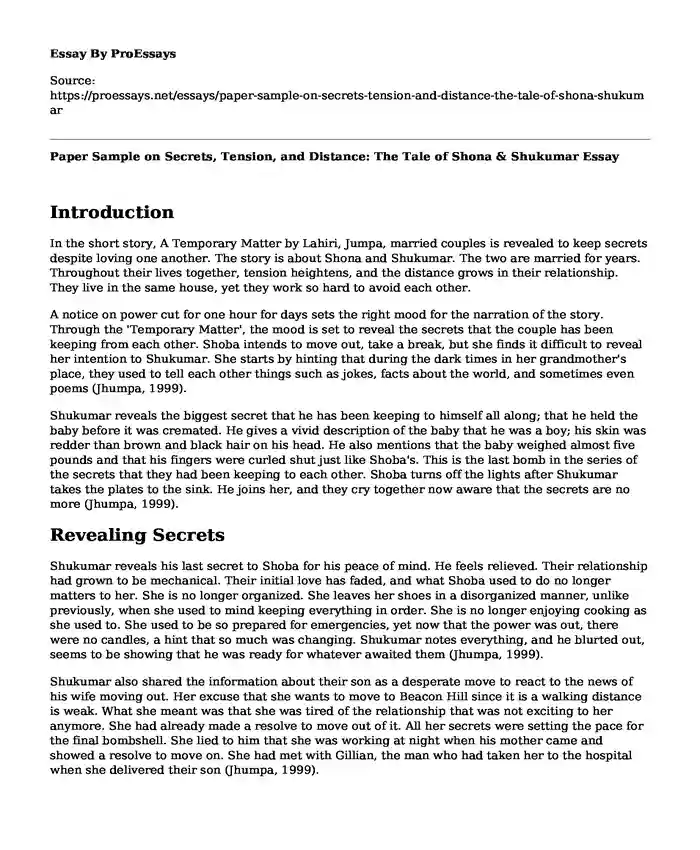Introduction
In the short story, A Temporary Matter by Lahiri, Jumpa, married couples is revealed to keep secrets despite loving one another. The story is about Shona and Shukumar. The two are married for years. Throughout their lives together, tension heightens, and the distance grows in their relationship. They live in the same house, yet they work so hard to avoid each other.
A notice on power cut for one hour for days sets the right mood for the narration of the story. Through the 'Temporary Matter', the mood is set to reveal the secrets that the couple has been keeping from each other. Shoba intends to move out, take a break, but she finds it difficult to reveal her intention to Shukumar. She starts by hinting that during the dark times in her grandmother's place, they used to tell each other things such as jokes, facts about the world, and sometimes even poems (Jhumpa, 1999).
Shukumar reveals the biggest secret that he has been keeping to himself all along; that he held the baby before it was cremated. He gives a vivid description of the baby that he was a boy; his skin was redder than brown and black hair on his head. He also mentions that the baby weighed almost five pounds and that his fingers were curled shut just like Shoba's. This is the last bomb in the series of the secrets that they had been keeping to each other. Shoba turns off the lights after Shukumar takes the plates to the sink. He joins her, and they cry together now aware that the secrets are no more (Jhumpa, 1999).
Revealing Secrets
Shukumar reveals his last secret to Shoba for his peace of mind. He feels relieved. Their relationship had grown to be mechanical. Their initial love has faded, and what Shoba used to do no longer matters to her. She is no longer organized. She leaves her shoes in a disorganized manner, unlike previously, when she used to mind keeping everything in order. She is no longer enjoying cooking as she used to. She used to be so prepared for emergencies, yet now that the power was out, there were no candles, a hint that so much was changing. Shukumar notes everything, and he blurted out, seems to be showing that he was ready for whatever awaited them (Jhumpa, 1999).
Shukumar also shared the information about their son as a desperate move to react to the news of his wife moving out. Her excuse that she wants to move to Beacon Hill since it is a walking distance is weak. What she meant was that she was tired of the relationship that was not exciting to her anymore. She had already made a resolve to move out of it. All her secrets were setting the pace for the final bombshell. She lied to him that she was working at night when his mother came and showed a resolve to move on. She had met with Gillian, the man who had taken her to the hospital when she delivered their son (Jhumpa, 1999).
Conclusion
Finally, Shukumar shared the last secret as a way of letting go. Even if his wife was to continue moving out, she would walk out knowing everything that existed in their marriage. Shoba has given up on Shukumar, and that marks an end to their relationship. She was all set to move out without his knowledge. Their tears are an indicator of an end.
Work Cited
Lahiri, Jhumpa. "A Temporary Matter." Interpreter of Maladies (1999): 1-22.
Cite this page
Paper Sample on Secrets, Tension, and Distance: The Tale of Shona & Shukumar. (2023, Sep 25). Retrieved from https://proessays.net/essays/paper-sample-on-secrets-tension-and-distance-the-tale-of-shona-shukumar
If you are the original author of this essay and no longer wish to have it published on the ProEssays website, please click below to request its removal:
- Literary Analysis Essay on Madness Theme Present in Hamlet by Shakespeare
- Racism in a Raisin in the Sun - Critical Essay
- Essay Example: Is Okonkwo a Tragic Hero?
- "The Yellow Wallpaper" as an Example of a Gothic Allergory Essay
- The Parable of the Sower by Octavia Butler Paper Example
- Article Analysis Essay on There May Be Flowing Water on Mars but Is There Intelligent Life on Earth?
- Essay on Ernest Hemingway's Women's Struggles: A Study of Gender Roles in the Early 20th Century







